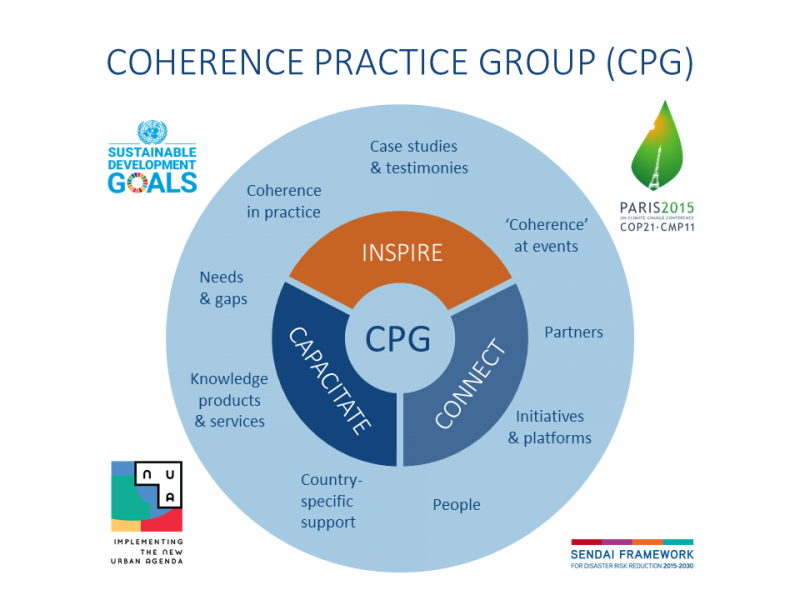Coherence Practice Group

Background
The gap in coherent planning, implementation and reporting is especially profound between the regional and the national level. Coherence between the agendas is often promoted at regional level both with regards to policy development and the operationalization of these policies in action plans. At national level, however, these approaches are not necessarily reflected, and no support mechanisms are available to support national level governments in learning from available experiences and coherent planning, implementation and reporting mechanisms in other countries in the region.
The complexities and requirements of translating the global agendas in coherent planning, implementation and reporting processes at national and local level are yet to be fully captured. Several initiatives are on-going to attempt to better understand what is required and translate it into practice, such as in Mexico and the Philippines. The priorities will be different from country to country, and it will take the concerted efforts of multiple partners working closely with governments to identify the main gaps and the types of support required by national and subnational actors.
A Coherence Practice Group, building on existing efforts and providing demand-driven support, is viewed as a beneficial modality of service delivery, and of knowledge brokering for the benefit of all. Countries will be supported in finding the right information and expertise and will be accompanied during the implementation of their own tailored solution.
Objectives
The CPG is established as a mechanism at regional level that collects good practices and country experiences, supports and capacitates countries on a demand-driven basis, connects like-minded partners, donors, and experts and systematically feeds the lessons learned and good practices back into the regional and international discourse.
The Coherence Practice Group aims to intensify regional exchange between policy and practice with regards to coherence between the global agendas. The following three objectives have been identified:
- Good practices and mature experiences from national and sub-national level are systematically documented and injected into regional and international discussions and processes.
- Concrete knowledge products, coaching, and advisory services are provided to selected countries based on specific demands and south-south learning cooperation is promoted.
- Partners working for coherence in the region are connected; cross-institutional partnership approach and inter-institutional dialogue across different levels of government and sectors are facilitated
These objectives recognize the importance of institutional and structural frameworks and the ability of the state to act effectively, with the support of its national and international development partners.
In Asia and the Pacific, the CPG provides tailored support to countries in the region based on specific requests. This initiative aims to promote a cross-institutional approach and foster dialogue across levels of government and sectors, by reach out to a broad range of national and subnational institutions, particularly beyond the lead agencies for the respective agendas. For this reason, efforts will be undertaken to engage with representatives from the ministries and departments in charge of planning, budgeting and financing, and statistics and reporting.
Partners
The CPG is an informal group of like-minded practitioners from international development partners and experts (‘champions’) committed to supporting greater practical coherence in the implementation of the global agendas at national and local levels, and actively advocating for a ‘good enough’ approach to coherence that can assist in leveraging international and national support to implement programmes contributing to the sustainable development goals and the targets and priorities set by the Paris Agreement and the Sendai Framework for Disaster Risk Reduction.
As stewards of the main global agendas, the United Nations is committed to translating the commitments into action and has a number of initiatives to support regional entities and governments in this endeavour. The United Nations is the natural partner when it comes to providing practical support to countries, through the regional mechanisms they convene, as well as the national level coordination and medium-term collective vision and response of the UN system consolidated in the United Nations Development Assistance Framework (UNDAF).
The CPG is engaging with long-standing partners of the GIDRM programme in the region, such as ADPC and the Regional Consultative Committee on Disaster Management, IFRC, UNESCAP, UNISDR and bilateral donors committed to strengthening disaster resilience and climate action.
To work across the three main global commitments, there is urgency for broader collaboration among diverse stakeholders, from the UN system and beyond. The GIDRM has partnered with the Global Network of Civil Society Organisations for Disaster Reduction (GNDR), representing the largest international network of its kind.
The Coherence Practice Group provides tailored support to countries based on specific requests. Get more information here.
